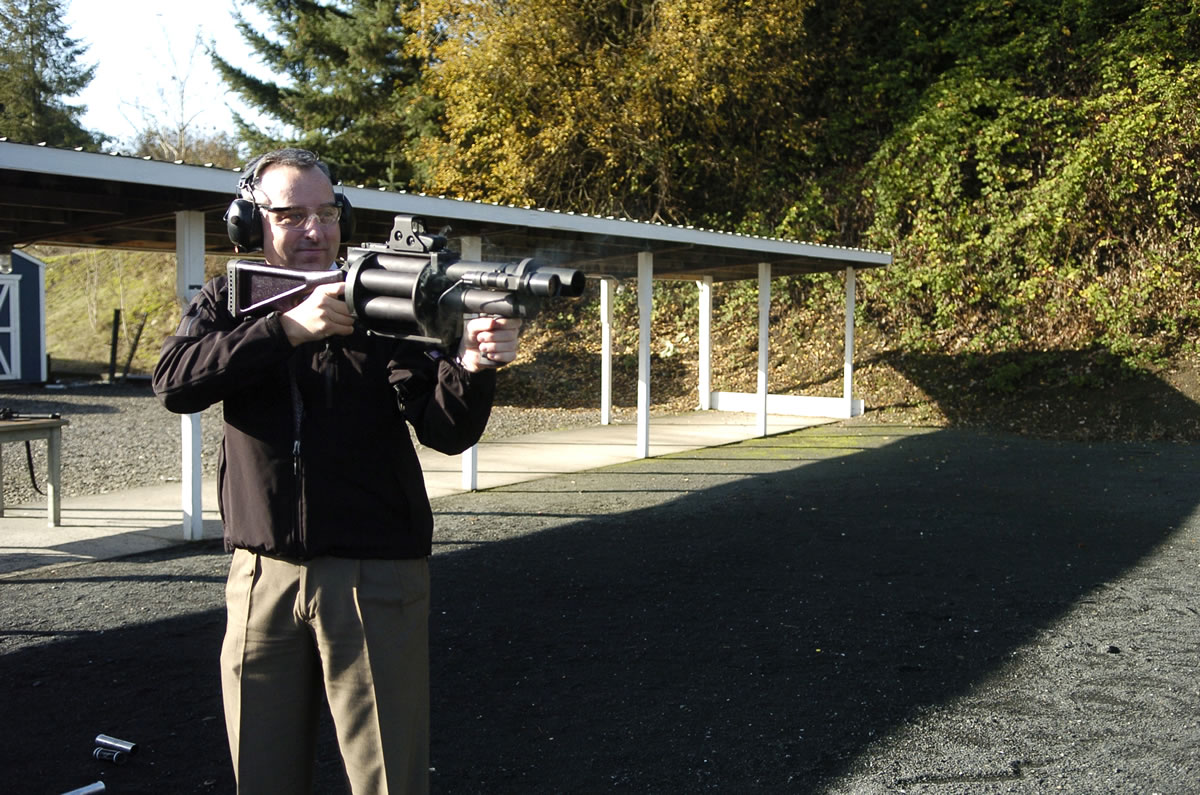It looks a bit like a grenade launcher and fires sponge batons at speeds similar to baseballs thrown by a major league pitcher. And, it’s one of local police agencies’ options to stop people who are potentially armed and not following police commands.
Clark County sheriff’s Detective Todd Barsness is quick to point out “less lethal” doesn’t mean “less-than-lethal” or nonlethal. There’s still a chance the weapons can cause a lethal injury but the risk is much lower than with traditional ammunition.
The gun is used to gain compliance through pain, while balancing out the sheriff’s policy of resolving situations with the lowest amount of force possible, he said.
“The idea is we want it to be strong enough to stop the threat …” but not strong enough to cause serious damage, he said. The gun can also be used in crowd control situations. In those cases, deputies are trained to bounce the baton off the ground to further lessen the impact.
The gun also has a “menacing factor,” Barsness said. Sometimes deputies get the desired results just by bringing the gun to the scene, he said.
“The more tools I have, the more options I have,” Barsness said. “This is another tool.”
Vancouver police first started using the baton-shooting guns in 1997.
Kim Kapp, spokeswoman for the Vancouver Police Department, said her department’s civil disturbance team uses a gun that fires “impact sponge rounds.” Officers on the team, a side duty, also use “grenades” filled with 32 caliber rubber balls that are fired off the ground for crowd control, she said. Patrol officers also use Tasers, which give an electric shock.
The sheriff’s office started using 12-gauge shotguns as less-lethal beanbag shooters in the 1980s. The guns’ grips and stocks were painted green to designate them was a less-lethal weapons, earning the name “green guns.”
The first generation of beanbag rounds were square, which caused them to lose accuracy. Barsness said the rounds were meant to impact with the flat face hitting the subject to minimize harm. Instead the rounds would often spiral like a Frisbee. Rounds were eventually redesigned to be round and sock-like to solve the problems.
In June 2011, Portland police officer Dane Reister mistakenly fired live rounds at a man who was allegedly not following police orders. The officer was using a less-lethal gun and intended to fire beanbag rounds at the subject, according to The Oregonian. It was the first time live rounds had been mixed with less-lethal rounds in Portland police history. The victim, identified as William Kyle Monroe of Bremerton, suffered a severed nerve in his left leg, his attorney told The Oregonian.
That’s not going to happen with the Clark County Sheriff’s Office, which completely phased out “green guns” a few years back, said Sgt. Fred Neiman said. Part of the reasoning for the switch was to prevent confusion between less-lethal and live munitions.
“There’s no way to confuse a lethal round with a less-lethal round in that 40 mm,” Neiman said.
Neiman declined to say how many less-lethal weapons the sheriff’s office has or how they are deployed. All patrol deputies are certified to use the gun, but not everyone has one, he said.
“We try to make it available when its needed,” he said. “There’s always one available, always.”
Battle Ground Lt. Roy Butler said his department is starting to phase the less-lethal shotguns out for 40 mm sponge shooters. They started the transition by buying two guns about six months ago but haven’t had to use one yet, he said.
He said the department hopes to eventually have one available in every car — it has a few take-home vehicles in addition to eight shared by patrol officers.



